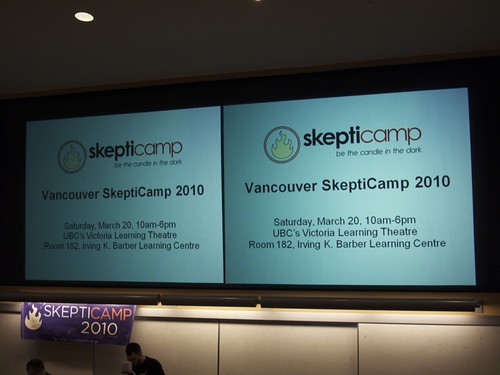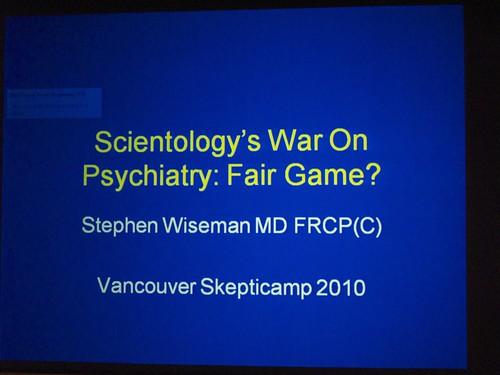That was a really awesome day. I’d never gone to a Skepticamp before, had only heard about it a few weeks before, and didn’t really know what to expect. I was sort of imagining a big convention sort of thing, with panels so I could pick and choose which brilliant presenter to study at the knee of. But no, it all took place in one auditorium at UBC, from 10AM to 6:30 (with a lunch break), an audience of about 80 people, and 16 presenters (more if you count the Radio Free Thinker people separately) expounding on a wide range of topics, from the scientific to the social to the philosophical.
It’s always a thrill to be in an explicitly skeptical space, where everybody’s speaking the same language, and you don’t have to worry about offending or confusing people by talking about “woo” or “the FSM” or “argument from ignorance” or whatnot. But even aside from that, and especially seeing as it was billed as a community participation event where anyone could register as a speaker, the level of polish was generally quite high and with just a couple of exceptions I really enjoyed the presentations. They were informative, funny, inspiring or infuriating, sometimes all four at once.
The best part of the event for me, though, wasn’t so much the talks, but the Twitter conversation happening in parallel; a half a dozen of us shooting comments back and forth, looking up and posting links, and it was so exhilarating! I’d never been part of such an online conversation, with so many interesting people who had been strangers a minute before. I felt like I was contributing to something greater than me, something important, unlike short back-and-forths in Facebook statuses.
Or maybe I’m overdramatizing this. I don’t care; it was a rush, and I can’t wait for my next opportunity. At least now I’ve figured out how to use hash tags. And another thing I’ve learned: next time I’ll be sure to bring a portable charger or something. Oh, my poor battery! That might explain why the twittering slowed way down in the afternoon; I guess everybody’s laptops and phones were running dry.
I’ll just post some thoughts on a few of the presentations, because otherwise we’d be here all week.
- Fred Bremmer: a demonstration of Charpentier’s Illusion
- Dr. Steve Wiseman: The Troubled Relationship between Psychiatry and the Church of Scientology
- James Bernath: Private programs for going into space
- Greg Bole: Defending Darwin
- Shannon Rupp: Rational Journalism
- Dr. Jaymie Matthews: Who Needs Paranormal?
- Gerry Armstrong: Scientology
Fred Bremmer: a demonstration of Charpentier’s Illusion
Basically, this involves underestimating the mass of a large but light object (in this case, an empty styrofoam cooler) against a smaller object (medicine bottles partly filled with copper shot). There are various theories about why we do this, but it’s very predictable, and in the end only three people in the entire audience got the mass right. Actual masses of the medicine bottles: here. What the audience perceived: here
The moral of the story? Skeptics, being human, aren’t free of biases and flawed perceptions. But we are more aware of them, and more willing to subject them to rigorous reality checks.
Dr. Steve Wiseman: The Troubled Relationship between Psychiatry and the Church of Scientology
Wow, that was some impressive airing out of LRon Hubbard’s dirty laudry, some of which I knew—that Hubbard was kind of a dismal failure at everything until he lucked into the Dianetics scam—some of which I didn’t: where did he first publish an essay on Dianetics? A cheesy sci-fi magazine. Awesome. Or should I say, “Astounding”? Plus, some interesting history about early psychiatric pharmacology, and how some of those successes seem to be directly linked to the rise of Scientology and LRon’s paranoia.
James Bernath: Private programs for going into space
Mr. Bernath is very skeptical of the viability of privately-funded space flight, because so far they haven’t gotten anywhere near what government programs have achieved. Which… I don’t think is a fair conclusion. I agree that there are tremendous technical problems, especially if you want to transport humans into deep space (or, hell, even as far as Mars). Not that humans can’t get there, of course, but casual tourists are right out. We won’t have a Mars Hilton on the Valles Marineris anytime soon. Two parts of his presentation grabbed me, though:
- Bernath also dismissed the idea of space elevators, since he saw too many problems just with getting the damn things up, not to mention docking spacecraft at the top. But my view is that since Arthur C. Clarke could imagine them, I believe they’ll be a reality some day, so nyah! Which is perfectly objective and rational, totally not magical thinking in any way. Really. Shut up.
- He brought a few interesting space artefacts to pass around. The best was a fuel tank from a downed Soviet satellite, which crashed in a Saskatchewan farm in 1981. Doesn’t look like much, a dark metallic sphere, with a weird nipple-like bit where reentry caused it to melt slightly. But it used to be up in space! I held in my hand something that floated in orbit high above the Earth! That’s… really fucking cool.
Greg Bole: Defending Darwin
Greg Bole is a Darwin impersonator. Didn’t think there was such a thing as a Darwin impersonator? Yeah, neither did I. I guess they get most of their business at events such as the Cambridge Darwin Festival. (Too bad Bole didn’t give his talk in costume, though.) The focus of his speech was on Ray Comfort (he of the banana as proof for God—no, it’s no better than the Babel Fish) and his plan last year to distribute copies of The Origin of Species, with a special new introduction. Of course, Bole points out, Comfort’s spiel is really nothing new. It’s just the same tired old canards creationists have been trotting out for decades. An audience member asked him if creationists have advanced any new arguments, in light of recent advances in genomics or paleontology. No, he said, it’s always the same old crap, maybe dressed it up a little (ie: Intelligent Design) but essentially unchanged.
Shannon Rupp: Rational Journalism
Rupp, a journalist herself, says, “Only journalists are in the business of journalism. Newspapers are in the business of eyeballs.” Editors and publishers don’t care about accuracy, or even truth, as long as it gets people buying their papers—and thus making advertisers happy, which is where their business really lies. Checking facts costs money, and it’s the easiest thing to cut because not many people notice, and fewer care. Besides, writing puff pieces is much safer since advertisers don’t get alienated, readers don’t get alienated, and you won’t get sued. in short, the whole system is set up to penalise good journalism and reward sloppy, shallow writing.
But, Rupp warns, don’t just blame the evil media and evil advertisers. Schools and universities, which should be in the business of educating, are also peddling woo and confusing students with pseudoscience. Just as a for instance: Royal Roads University offering a course on astrology. The university gets more money, but also gets inextricably linked with the astrologers and entrail readers and whatnot. The latter get recognition and prestige, while the university’s reputation gets tarnished.
Dr. Jaymie Matthews: Who Needs Paranormal?
Ah yes, Jaymie Matthews. I remembered him from a CFI talk he gave a year ago, about the MOST deep-space telescope. It’s so obvious that he loves his work, because it’s cool science and because it reveals so much of the beauty of the universe. How many exometeorologists—ie: people figuring out weather patterns on extrasolar planets—do you know? One line he said really stuck with me: “Paranormal is the new normal; normal is the new paranormal.” Paranormalists’ myths and imaginations are really very small and petty when you come right down to it. Especially when it’s Nazi-flavoured occult crap being peddled to suckers. Reality, as revealed through science, is the thing that’s mindbogglingly weird and crazy and enchanting.
Gerry Armstrong: Scientology
This is the personal account of an ex-Scientologist who has been persecuted by the Church of Scientology for decades now. His talk—the attempts on his life, the harassment, the insane lawsuits—just drove home how disgustingly evil the Clams are. Read more on gerryamstrong.org
In conclusion
I had such an amazing time, and I’ve already marked down the next Skepticamp’s date (October 23rd)! Meantime, here are more pictures!




